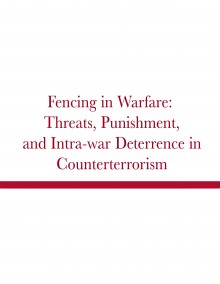New theoretical approaches have been developed that apply deterrence and coercion to counterterrorism. Critics have suggested, however, that in the particular case of deterring terrorism by threats of punishment, a mismatch exists between deterrent goals and counterterrorism intentions: the twin aims of destroying and deterring a single opponent is logically and theoretically incompatible. These criticisms, however, neglect to take two important factors into consideration. First, threats of punishment in counterterrorism can be applied against a wide assortment of actors involved in and associated with terrorism and political violence. Second, the concept of “intra-war deterrence” suggests ways in which a state can deter certain behavior or a specific form of warfare while engaging in open conflict with that same adversary. In exploring both factors, this article posits that states can gain coercive leverage over different actors involved in terrorism, including organizations with which they are actively hoping to defeat.
Alex Wilner is a visiting fellow and lecturer at the Munk School of Global Affairs, University of Toronto, Canada.
